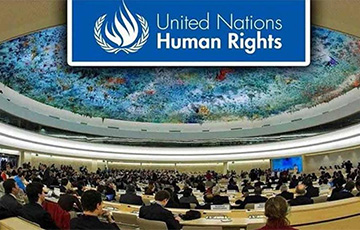What Awaits Lukashenka After UN Report On Minsk Crimes
31- 22.03.2023, 16:31
- 50,120

The document is of strategic importance.
Belarus faces "an unacceptable picture of impunity and the almost complete destruction of civil society space and fundamental freedoms". Systematic violations of international human rights law are widespread in the country, including unlawful deprivation of life and cases of arbitrary deprivation of liberty, torture and ill-treatment, sexual and gender-based violence, violations of the rights to freedom of expression, peaceful assembly and association… The UN High Commissioner for Human Rights drew these conclusions in the report on the human rights situation in Belarus published on the eve of the presidential elections in 2020 and after them. Lawyers explained to DW what implications the report's findings would have on the regime.
The report of the United Nations High Commissioner for Human Rights (OHCHR) is based on interviews with 207 victims of the actions of the security services and witnesses of the events, an analysis of more than 2500 items of evidence. The document calls on UN member states to consider bringing the perpetrators to justice through national mechanisms and provide additional protection measures for victims, witnesses and others who have left the country.
The report will help to open a case against the perpetrators abroad
International lawyer Viktoria Fedorova notes that Belarussian events are qualified not just as violations of human rights but as an international crime against humanity for the first time at the international level.
Mrs Fedorova draws attention to the fact that the wording in the report is quite mild: "some of these violations may amount to crimes against humanity". The lawyer explains that the final decision can only be made by a court either national or international. She considers it important to note that the regime actually ignored the previous remarks of the OHCHR: the authorities refused to receive UN representatives in Belarus.
“This report can't serve as the only grounds for the creation of an international tribunal for Belarus. Such tribunals were previously created by the UN Security Council, however, its permanent members are friends of the official Minsk - Russia and China. Having the right of veto, they will simply block such a decision,” the expert says. “However, the report can be used as an authoritative document in initiating criminal cases in other countries based on the principle of universal jurisdiction.”
Viktoria Fedorova believes that torture is such a serious crime that the world cannot simply bypass it. For example, Lithuania is already working in this direction: more than 40 Belarusians have already been recognized as victims. Lithuanian investigators are working with them. They are also interviewing the witnesses, for example, former security officials and judges, who can tell how the law enforcement and judicial systems work in Belarus. However, this process is not fast. No one can accurately indicate the terms of the preliminary investigation process. The Belarusian judges and security officials have not been put on the international wanted list so far.
Is the establishment of an International Tribunal likely?
International lawyer Ekaterina Deikalo points out that the UN report is of strategic importance. “Now this is not just a statement by the victims or Belarusian human rights activists, this is the conclusion of the human rights relevant superior UN authority,” she notes. “The report gives impetus to work out specific corpus delicti. This will be important for the future tribunal.”
Mrs Deikalo agrees with Viktoria Fedorova that in the case of Belarus, one can hardly expect the establishment of an International Tribunal, but she gives another reason. “Taking into account all the pain of the Belarusian people, the scale of the events is not enough for the establishment of a separate tribunal. For comparison, you need to look at what happened in Yugoslavia and Rwanda, according to which such a tribunal was created," the expert says. "In our case, we can count on the creation of a hybrid tribunal, where international judges will work together with Belarusian judges. This will give a good impetus to the development of the national judicial system.”
This is possible only after the change of power, which will be ready for such a trial.
At the same time, the UN Human Rights Office has compiled cases against Belarusian officials who are responsible for severe violations of human rights, their actions can be qualified as crimes under international law. Thus, the OHCHR recorded at least five cases of unlawful deprivation of life during protests.
The support of the war in Ukraine is to be considered a separate international crime and it is possible to create an international tribunal on its grounds. Both Belarus and Russia are to be tried since Belarussian territory and infrastructure are being used for the attacks.
In what way could the UN report affect sanctions?
The Belarusian authorities are seeking to lift the ban on the supply of potassium to the world market by appealing to the UN. The Belarusian MFA says that the restrictions imposed by the West undermine food security in the world. In May 2022, the UN Secretary-General proposed easing potash sanctions imposed on Russia and Belarus in exchange for the safe transportation of grain from Ukraine. Will his position change after the report of the High Commissioner for Human Rights?
“I don’t think that the report here will affect the sanctions,” Viktoria Fedorova believes. She recalled that The Committee on Economic, Social and Cultural Rights (CESCR) recommended that Lithuania, which had banned the transit of Belarusian potash fertilizers through its territory, should resume the transportation. “States do not always implement these recommendations,” the lawyer notes. “According to our estimates, Belarus has implemented only 3 out of 67 recommendations of the UN Committee against Torture (CAT). Political justifications are more important than legal ones in matters of sanctions.”










